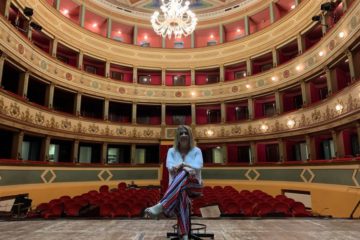Following last year’s tremendous success, Italian conductor Enrique Mazzola is returning to Chicago to conduct Bellini’s bel canto masterpiece I Puritani at Lyric Opera of Chicago. Maestro Mazzola conducted Donizetti’s Lucia di Lammermoor last season to rave reviews. He is a master of bel canto, sought all over the world for his fresh interpretations.
How does it feel to be back in Chicago conducting another bel canto masterpiece?
I’m really happy – it’s a fantastic feeling to encounter the musicians and singers of the Lyric again. It’s like sharing good memories of the last time we met and being all together awaiting with joy and excitement our next production together!
Last year at Lyric you conducted Lucia. This year it’s I Puritani. What are the differences between conducting Donizetti and Bellini?

Photo credit: Eric Garault
From the point of view of conducting, there aren’t technical differences. They both speak a common language, which is the musical style of early Italian romanticism. But it’s more about how they speak this language: Donizetti more as a support for strong dramaturgy, Bellini using the music as pure poetry.
Do you have a favorite part of I Puritani?
I smile because actually I love all parts of Puritani. Each single musical phrase is a concentration of bellezza, of beauty.
In the beginning of the opera, when you hear the offstage “Preghiera,” well, this is an example of bellezza: a small quartet sung by Elvira, Arturo, Riccardo, and Giorgio made of pure bel canto singing, which gives an immediate taste of Bellini’s romanticism.
Can you give us any I Puritani spoilers? Are you doing anything unconventional with your interpretation?
I think that my way of conducting bel canto is in some ways unconventional. My personal style is mixing two elements, which are accepting some traditions (meaning differences which are not written in the vocal score but that were proposed by our teachers, our musical fathers and grandfathers) and restoring the details written in the vocal score (because after almost two centuries, many singers have gotten into the habit of singing this repertoire with too much personal freedom and interpretation).
Bel canto is one of those sub-genres that gets a lot of flak: there’s too much fluff and not enough substance dramatically and musically; there’s too much emphasis on the melody; too much rides on a single diva role; etc. What do you find so captivating about this sub-genre artistically? Does bel canto deserve its reputation?
I guess it’s a point of view. Bel canto for me is not a sub-genre, and actually it’s the pillar of all Romantic opera, meaning, without bel canto, there is no Verdi, no verismo, and probably a very poor German operatic world with a sad Wagner living in a musical world without beautiful music phrases.

Photo credit: Miquel Perales
I know many singers and conductors develop reputations in a certain genre, composer, or style. You are one of the most sought after conductors of bel canto, for instance. Are there other types of opera you enjoy conducting besides bel canto? Do you ever wish you got to do more of a different style?
I actually divide my musical life between opera and symphonic concerts, so I work with a very wide repertoire, from early classical to contemporary music. Yes, it’s true, in opera in the last 10 years I wanted to elaborate on bel canto repertoire, but I also conducted a lot of French repertoire (I have the privilege to conduct a Meyerbeer cycle in Berlin) and contemporary opera.
The desert island question: you can bring three and only three opera recordings with you. Which ones do you bring?
René Jacobs, Mozart, Così fan tutte HM
Carlos Kleiber, Puccini, La bohème, live from la Scala 1979
Claudio Abbado, Rossini, Il barbiere di Siviglia, DG
When you’ve got a night off in Chicago, where do you go and what do you do?
I love to walk in Chicago. In good weather, I’m often around the river walk, looking for good restaurants. Chicago is for me a really fascinating city, and I like to explore the different neighbourhoods!
To finish, I’d like to ask a question I ask everyone: what is it about opera that touches your soul?
I love opera because we see onstage different stories, with different sentimental and life situations: in one opera or in another, there is a certain moment where we see onstage something that happened to us in real life. And when we see it, when we identify ourselves with this specific moment onstage, there is a thrill, a frisson, that we will never forget in our life.



1 Comment
In Review: Lyric Opera of Chicago's I puritani, 2018 | Opera Sense · February 10, 2018 at 1:39 pm
[…] Enrique Mazzola on I Puritani at Lyric Opera of Chicago […]
Comments are closed.